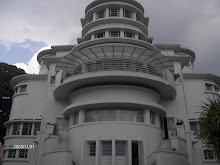Periods of English Literature by Nazmi Maulida (0805384) 3B1
Name : Nazmi Maulida
Class : 3B1
SN : 0805384
Periods of English Literature
Periods of English Literature divided into eight periods: Old English Period, Middle English Period, Renaissance, Augustan Age, Romantic period, Victorian Age, and Modernism, Postmodernism.
The first is Old English Period. Old English literature encompasses literature written in Old English (also called Anglo-Saxon, during the 600-year). There are two types of Old English poetry; The Heroic Germanic pre-Christian and The Christian. Next, there are also Elegiac, Classical and Latin poetry. Beside the poetry, there are also written in Old English Period; Prose (included Secular Prose, Christian Prose; The most widely known author of Old English was King Alfred). The amount of surviving Old English prose is much greater than the amount of poetry.
The second is Middle English Period (from approximately 1336). An example of late Middle English literature is Sidrak and Bokkus. There are three main categories of Middle English Literature: Religious, Courtly love, and Arthurian. In Europe, middle age is considered from 5th to 15th century.
The third is Renaissance (from the early 16th century to the early 17th century). Sometimes this era is referred to as "the age of Shakespeare" or "the Elizabethan era". Besides, England came closer to reaching modern science. The English Renaissance is different from the Italian Renaissance in several ways. The dominant art forms of the English Renaissance were literature and music. In Italian Renaissance there was Visual Arts. The major literary figures in the English Renaissance include: Francis Bacon, Thomas Dekker, John Donne, John Fletcher, John Ford, Ben Jonson, Thomas Kyd, Christopher Marlowe, Phillip Massinger, Thomas Middleton, John Milton, Sir Thomas More, Thomas Nashe, William Rowley, William Shakespeare, James Shirley, Sir Philip Sidney, Edmund Spenser, John Webster, Sir Thomas Wyatt.
The fourth is Augustan Age (Early Modern Period; in the first half of the 18th century). The contents of this period are Prose (the essay/ journalism, philosophy and religious writing, the novel), Poetry, and Drama. In this era the literature began to appear from all over the kingdom.
The fifth is Romantic Period. The most popular novelist of the era was Sir Walter Scott. He is inspired a generation of painters, composers, and writers throughout Europe. Early Romantic Poets brought a new emotionalism and introspection, and their emergence. The first Poet in England were the Lake Poets, a small group of friends including William Wordsworth and Samuel Taylor Coleridge. The "Second generation" of Romantic poets includes Lord Byron, Percy Bysshe Shelley, Mary Shelley and John Keats.
The sixth is Victorian Age (1837-1901). The Bronte sisters are the best known works of the era. They have the emotionally powerful works. The Bronte sisters were English writers of the 1840s and 1850s. They had written compulsively from early childhood and were first published.
The seventh is Modernism (between 1900 and the middle 1920s). The several majors in this era are the seminal short story collection Dubliners by James Joyce, Joseph Conrad's Heart of Darkness, and the poetry and drama of William Butler Yeats. Pablo Picasso is the most popular artist in this era.
The eighth is Postmodernism. A list of postmodern authors often varies; William Burroughs (1914-1997), Alexander Trocchi (1925-1984), Kurt Vonnegut (1922-2007), John Barth (b. 1930), Donald Barthelme (1931-1989), E. L. Doctorow (b. 1931), Robert Coover (1932), Jerzy Kosinski (1933-1991) Don DeLillo (b. 1936), Thomas Pynchon (b. 1937), Ishmael Reed (1938), Kathy Acker (1947-1997), Paul Auster (b. 1947)[1], Orhan Pamuk (b. 1952). The term Postmodern literature is used to describe certain tendencies in post-World War II literature.
References:
www.wikipedia.com
Klarer, Mario. (1998). An Introduction to Literary Studies. London: Routledge.
Kamis, 01 Oktober 2009
Langganan:
Posting Komentar (Atom)


Tidak ada komentar:
Posting Komentar